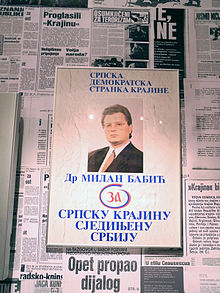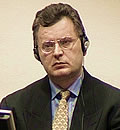Milan Babic
Milan Babić ( Serbian Милан Бабић ; born February 26, 1956 in Kukar near Sinj ; † March 5, 2006 in Scheveningen ) was a Yugoslav politician of the Serbian Democratic Party (SDS) in Croatia and from 1991 to 1992 president of the internationally unrecognized Republic of Serbian Krajina and convicted war criminal .
Life

Babić was originally a member of the Communist Party of Croatia and a dentist by profession. After the founding of the SDS in 1990, Babić became one of the party's key figures and was party chairman from 1992 to 1995 after the death of Jovan Rašković . During the Croatian War , Babić held several important posts; He was mayor of the city of Knin and first president, later foreign minister, then prime minister of the internationally unrecognized republic of Serbian Krajina , before the Croatian military operation Oluja ended its existence.
War crimes
In November 2003, the International Criminal Tribunal for the Former Yugoslavia (ICTY) in The Hague presented its indictment against Babić. He was charged with participating in the persecution, expulsion and murder of Croats and other non-Serbian populations from the east and south of Croatia in the early 1990s. The charges were crimes against humanity and violations of the laws or customs of war . Babić volunteered on November 26th.
Repentant key witness
As a result, there was an understanding between the defense and the prosecution, according to which Babić admitted to being guilty in the sense of the prosecution on the first point, crimes against humanity, and assured the prosecution that he would cooperate fully. This included the willingness to testify in other trials before the ICTY - as an “insider” he was a possible witness in the trials against Slobodan Milošević , Momčilo Krajišnik , Vojislav Šešelj , Jovica Stanišić , Franko Simatović , Milan Martić and Goran Hadžić . In return, the prosecution dropped all other charges and agreed to plead for a sentence of no more than 11 years in prison and to take measures to protect Babić and his family. Before the ICTY pronounced its verdict, Babić expressed deep regret for his actions; he asked for forgiveness in the following words:
“ I stand before this judgment and I feel deep regret and shame. I've been involved in the worst kind of crimes against people, and that's only because they are Croatians, not Serbs. I ask forgiveness from the Croatian brothers. "
On the basis of the agreement, Babić was sentenced in the first instance to 13 years in prison on June 29, 2004 , which the Appeals Chamber confirmed on July 18, 2005 .
Babić, who was serving his sentence in another prison, was sent back to the United Nations Detention Unit of the ICTY on February 7, 2006 to testify as a witness in the trial of Milan Martić . He hanged himself in his cell on the evening of March 5, 2006 and was buried on March 21, 2006 in Belgrade.
Web links
- ICTY documents to the process (English)
- Milan Babic's confession of guilt before the ICTY (English)
| personal data | |
|---|---|
| SURNAME | Babic, Milan |
| ALTERNATIVE NAMES | Бабић, Милан (Serbian) |
| BRIEF DESCRIPTION | Serbian politician, war criminal and President of the Republic of Serbian Krajina |
| DATE OF BIRTH | February 26, 1956 |
| PLACE OF BIRTH | Kukar , Croatia |
| DATE OF DEATH | March 5, 2006 |
| Place of death | The hague |
